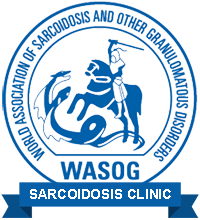Anti-cyclic citrullinated peptide antibodies in patients with sarcoidosis
Keywords:
sarcoidosis, anti-CCP antibodies, prevalenceAbstract
Introduction: Anti-cyclic citrullinated peptide (anti-CCP) antibodies have a high predictive value in rheumatoid arthritis (RA) patients and are associated with disease severity. Sarcoidosis is a chronic inflammatory disease characterized by non-calcified granuloma formations. Aim: To determining the prevalence of anti-CCP antibodies in patients with sarcoidosis, and identifying a possible correlation with clinical and laboratory findings. Materials and Methods: Forty-two patients presenting to the rheumatology polyclinic and diagnosed with sarcoidosis as a result of the examinations made, 45 RA patients and 45 healthy subjects were included in the study. Demographic, clinical, serological and radiological data of all patients were recorded. Anti-CCP antibodies were evaluated by using a second-generation ELISA method. Rheumatoid factor (RF) IgM was determined with the nephelometry method. Results: Forty-two patients (10 males) were included in the study. Mean patient age was 45.2 years (20-70 years) and mean duration of disease was 3.5 years. Two sarcoidosis patients (4.7%) and 38(84.4%) RA patients were found to be positive for anti-CCP antibodies while the antibody wasn’t detected in any healthy subject. The two sarcoidosis patients found positive for anti-CCP were also diagnosed with rheumatoid arthritis. RF positivity was detected in 7 sarcoidosis patients (16.6%) and in only one subject in the control group. Conclusion: The prevalence of anti-CCP antibodies in patients with sarcoidosis was found to be significantly lower than RA patients and similar with the healthy control group. This result shows that anti-CCP antibodies don’t have an important role in the pathogenesis of sarcoidosis, but could be important in revealing the overlap syndromes of sarcoidosis-RADownloads
Published
Issue
Section
License
This is an Open Access article distributed under the terms of the Creative Commons Attribution License (https://creativecommons.org/licenses/by-nc/4.0) which permits unrestricted use, distribution, and reproduction in any medium, provided the original work is properly cited.
Transfer of Copyright and Permission to Reproduce Parts of Published Papers.
Authors retain the copyright for their published work. No formal permission will be required to reproduce parts (tables or illustrations) of published papers, provided the source is quoted appropriately and reproduction has no commercial intent. Reproductions with commercial intent will require written permission and payment of royalties.

This work is licensed under a Creative Commons Attribution-NonCommercial 4.0 International License.




